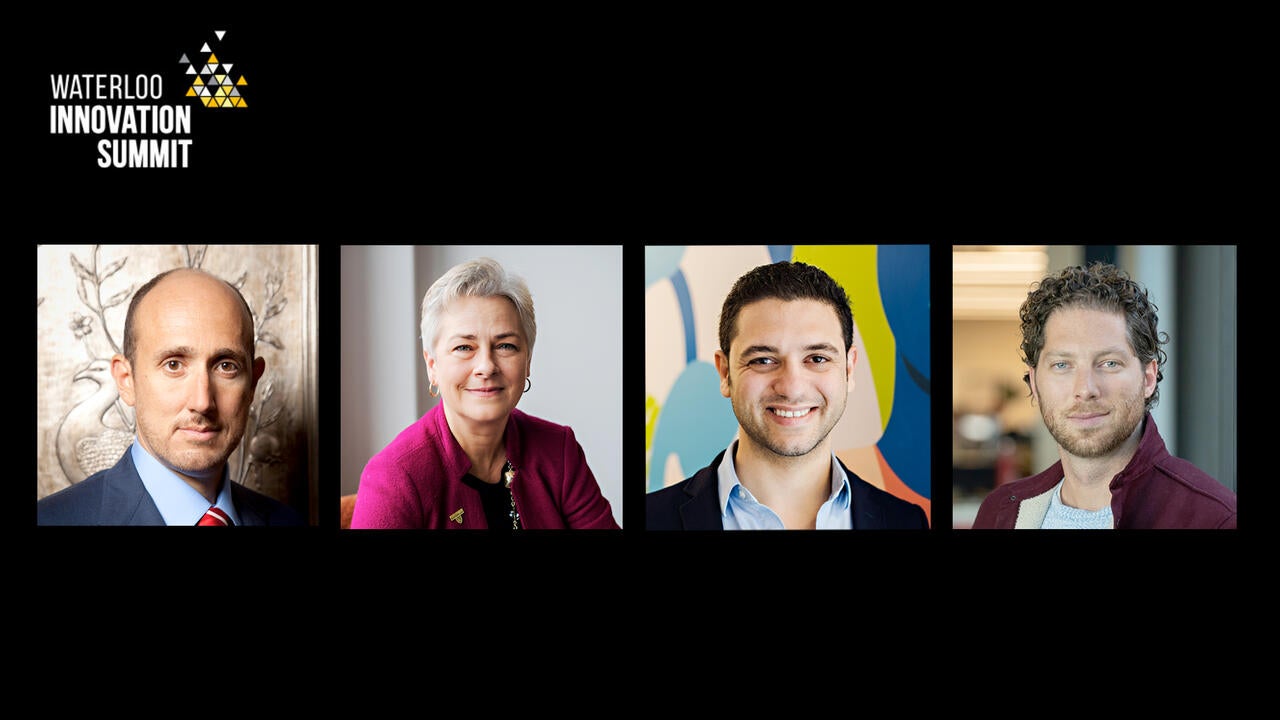
COVID accelerates the need for a resilient and adaptable workforce
Leaders at Waterloo Innovation Summit share insights on the talent imperative in the face of disruption

Leaders at Waterloo Innovation Summit share insights on the talent imperative in the face of disruption
By Angelica Sanchez University RelationsThe COVID-19 pandemic has forced industries to re-evaluate and transform their purpose. Canada and the world need a resilient and future-ready workforce to help drive our economic recovery.
During the University’s first virtual Waterloo Innovation Summit, industry leaders explored how attracting and retaining highly-skilled talent has quickly become a top priority across organizations in all sectors.
“Waterloo is on the leading edge of developing career-ready, talented graduates — the next generation of driven, ambitious and inquisitive employees,” Charmaine Dean said, vice-president of research and international at the University of Waterloo. “They will make up the resilient and adaptable workforce that is really needed in this era of accelerated change.”
Here are three insights from the Summit on how future talent and the digital revolution will accelerate global change as we look to reset, rebuild and rebound in a post-COVID world.
“We are in the most transformative economic moment since World War II,” began Randall Lane, chief content officer and editor at Forbes Magazine and keynote speaker at the Waterloo Innovation Summit. “[Virtual] gatherings like this have never been more essential.”
Adopting words from Niccolo Machiavelli, Winston Churchill and Rahm Emanuel, Lane encouraged listeners to “never waste a good crisis,” emphasizing the importance of tapping into today’s technology and talent to break down previous workplace barriers.
“What excites me is that people can now be pretty much anywhere they want,” Lane said. “We’ve made many hires in the past few months, almost none of them have been in New York because we’re realizing it’s not as necessary to be at the home [head] office. And so what that does is actually takes the pressure off any region to have to hone only its business ecosystem … it really makes it holistic, where if it’s a place where people want to live, it’s [also] now a place that people can work.”
Anticipating this shift in the workplace, Forbes created a list outlining five major trends that are resurfacing during these constantly changing times:
Increasingly, we’re seeing that being good to people is good for business, Lane said, reiterating how the future of talent is becoming a top priority for organizations in all sectors. Lane also acknowledged the critical role universities play in preparing students to adopt new trends and digital skills that employers will need to succeed in different industries.
The rate at which organizations have adopted digital technologies is accelerating dramatically. From spikes in e-commerce to adoption of new digital applications that make working remotely happen — companies have redefined their objectives and adapted.
“The longer we are in this state of working remote … the more it shows that we as a society can be economically productive in this world, the more permanent this is ultimately going to be,” Michael Litt (BASc ’11), co-founder and CEO of Vidyard, said.
Looking at the future of work, Litt applauded organizations like Waterloo, that hav embraced digital communication practices to keep employees connected.
“If you don’t use video during a Zoom call or you’re not using Slack’s calling feature, or you’re not using asynchronous communications, ultimately, you’re not able to be productive. And frankly, as a business owner, the impact to [operation expenditures] is phenomenal.”
As the world continues to break down geographical barriers with borderless, digital solutions, increased opportunities to recruit top talent are bound to follow.
Norah McRae, associate provost, co-operative and experiential education, pointed to Waterloo’s ahead-of-the-curve approach equipping current students with future skills leading to global solutions. Having seen 21,000 students in paid work terms in 62 countries last year, McRae noted that Waterloo is dismantling previous geographic hurdles.
“We hosted over a million interviews and applications last year, and lots and lots of in-person interviews — those all went virtual over the course of a weekend. All employers became very comfortable interviewing students in a virtual environment,” McRae said. “I think this will continue to open up our reach so that our talent can get to where the talent needs are global.”
Martin Basiri (MASc ’13), co-founder and CEO of Applyboard, found the workplace shift to be a harmonious time, he was fascinated by how capable humans are at helping each other in the face of a global pandemic. It’s these soft skills, he says, that will build the future, empathetic workplaces that the world needs.
“What COVID brought for our company is how important soft skills are for the employees of tomorrow, for the workforce of tomorrow,” Basiri said. “The very thing that we should as a society work more on is self-managing and even looking at financial literacy that yes, may not affect the inside workings of the company, but [will help an] employee’s life when the hard things happen.”
The next Waterloo Innovation Summit is scheduled for August 19, where industry leaders will discuss how innovation and entrepreneurship are driving the future economy of Canada.

Read more
Industry leaders share insights on how to future-proof the Canadian workforce

Read more
Leaders tell Waterloo Innovation Summit to fund basic research to commercialize unexpected outcomes

Read more
Speakers series generates dialogue and action on the world’s most pressing issues.
The University of Waterloo acknowledges that much of our work takes place on the traditional territory of the Neutral, Anishinaabeg, and Haudenosaunee peoples. Our main campus is situated on the Haldimand Tract, the land granted to the Six Nations that includes six miles on each side of the Grand River. Our active work toward reconciliation takes place across our campuses through research, learning, teaching, and community building, and is co-ordinated within the Office of Indigenous Relations.